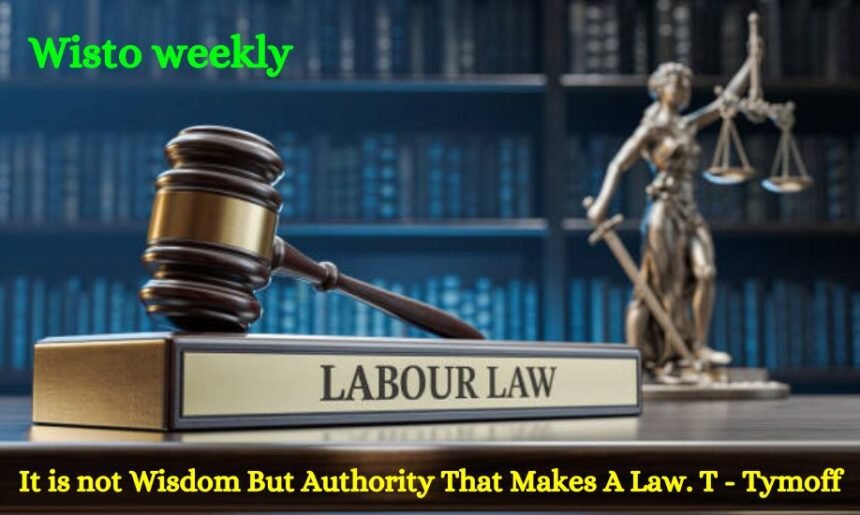Introduction
“It is not Wisdom But Authority That Makes A Law. T – Tymoff” is a powerful quote that challenges our understanding of the origins of law and its enforcement. This statement sheds light on the role of authority in shaping legal systems, emphasizing that laws are often the product of those in power rather than being rooted in wisdom or justice. In this detailed article, we will explore the meaning and implications of this quote, its relevance in today’s world, and the broader philosophical and legal perspectives it encompasses.
What Is It is not Wisdom But Authority That Makes A Law. T – Tymoff?
Meaning and Interpretation
“It is not Wisdom But Authority That Makes A Law. T – Tymoff” suggests that the creation and enforcement of laws are primarily driven by those in positions of power, rather than by wise or just principles. This quote underscores the reality that authority, not necessarily wisdom, often dictates the legal framework within which societies operate. It raises important questions about the nature of justice and the legitimacy of laws that may be enacted without a foundation in ethical or rational thought.
Background and Context of “It is not Wisdom But Authority That Makes A Law. T – Tymoff”
Source and Authorship
The quote “It is not Wisdom But Authority That Makes A Law. T – Tymoff” is attributed to Tymoff, an enigmatic figure whose other works and insights may offer additional context to this statement. While specific details about Tymoff are limited, the quote itself resonates with a long-standing critique of the relationship between power and law.
Common Usage
This quote is often cited in discussions about the nature of legal systems, political power, and the ethical considerations of lawmaking. It appears in various contexts, including:
- Political debates highlighting the influence of authority in the creation of laws.
- Philosophical discussions on the nature of justice and the role of power.
- Legal critiques focusing on the potential disconnect between law and morality.
The Role of Authority in Lawmaking
Authority vs. Wisdom
The distinction between authority and wisdom in the context of lawmaking is a critical one. Authority refers to the power or right to enforce obedience and make decisions, often derived from a position of control or governance. Wisdom, on the other hand, implies a deep understanding and sound judgment that guide ethical and just decision-making.
In many legal systems, laws are enacted by those who hold authority, such as legislators, rulers, or governing bodies. These individuals or groups may not always act out of wisdom or a commitment to justice but may be influenced by political agendas, economic interests, or social pressures. This dynamic can result in laws that serve the interests of the powerful rather than reflecting wise and just principles.
Relevance of “It is not Wisdom But Authority That Makes A Law. T – Tymoff” in Today’s World
Modern Legal and Political Systems
In contemporary society, “It is not Wisdom But Authority That Makes A Law. T – Tymoff” remains a relevant critique of how laws are made and enforced. Modern legal systems are often complex and multifaceted, with laws being shaped by a myriad of factors, including political power dynamics, lobbying efforts, and social movements. This quote highlights the need for vigilance in ensuring that laws are not merely the product of authority but are also rooted in wisdom and justice.
Examples and Case Studies
Several examples illustrate the tension between authority and wisdom in lawmaking:
- Legislative Lobbying: In many democratic countries, lobbying by powerful interest groups can significantly influence legislation. This can result in laws that favor specific industries or corporations rather than serving the public good.
- Authoritarian Regimes: In authoritarian states, laws are often enacted by a central authority without democratic processes or input from the populace. These laws may reflect the interests of the ruling elite rather than the welfare of the citizens.
- Judicial Decisions: The interpretation and enforcement of laws by the judiciary can also be swayed by political pressures, leading to decisions that uphold authority rather than justice.
Philosophical and Legal Perspectives on “It is not Wisdom But Authority That Makes A Law. T – Tymoff”
Philosophical Insights
Philosophically, “It is not Wisdom But Authority That Makes A Law. T – Tymoff” resonates with critiques of authoritarianism and the concentration of power. Thinkers like John Locke and Jean-Jacques Rousseau emphasized the importance of a social contract where laws are based on the consent of the governed and reflect collective wisdom and justice.
Legal Theories
Legal theorists have long debated the balance between authority and wisdom in lawmaking. Natural law theory, for instance, argues that laws should be based on inherent moral principles and reason. In contrast, legal positivism holds that laws are valid if they are enacted by legitimate authority, regardless of their moral content. This debate underscores the complexity of ensuring that laws serve both authority and wisdom.
Related Quotes and Concepts
Similar Quotes
Several quotes explore similar themes to “It is not Wisdom But Authority That Makes A Law. T – Tymoff”:
- “Power tends to corrupt, and absolute power corrupts absolutely.” – Lord Acton
- “The law is reason, free from passion.” – Aristotle
These quotes highlight the dangers of unchecked power and the importance of rational and ethical considerations in lawmaking.
Broader Themes
The broader theme of authority and its role in society is a recurring topic in political and legal philosophy. It addresses the challenges of creating laws that balance the need for order and governance with the principles of justice and wisdom.
Conclusion
“It is not Wisdom But Authority That Makes A Law. T – Tymoff” is a profound statement that challenges us to reflect on the nature of law and the dynamics of power. By examining the meaning, context, and implications of this quote, we gain a deeper understanding of the complexities of lawmaking and the importance of ensuring that laws are not only authoritative but also wise and just. This article has explored various dimensions of this quote, highlighting its relevance in today’s world and the philosophical and legal perspectives that it encompasses.



